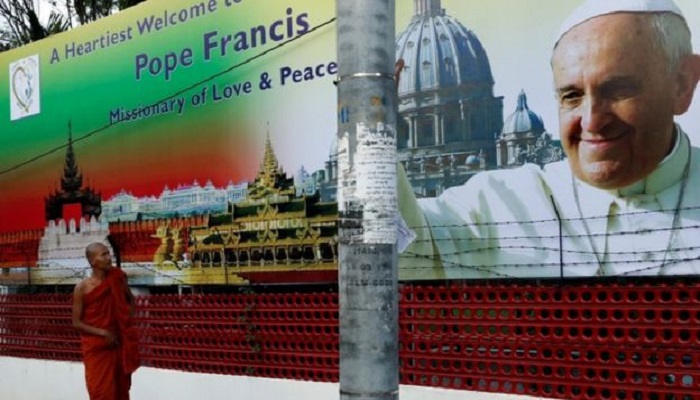
Religion is one of the few factors that bind one human with another. But what if that one factor leads to mass killing and evacuation of a community?
Pope Francis left Rome on Sunday night and will become the first pope to visit Myanmar when he arrives Monday.
The world’s most high-profile Christian is about to take center stage in a staunchly Buddhist country accused of horrifying acts of brutality against its Rohingya Muslim minority.
The Pope has previously decried violence against the Rohingya, calling them his persecuted “brothers and sisters.”
Experts warn that this trip will require balancing a uniquely complicated set of humanitarian, diplomatic and religious questions. Even his own cardinal has advised the Pope to steer clear of the word Rohingya for fear of stalling his message of reconciliation before it has even begun.
Aaron Connelly, a research fellow at Australia’s Lowy Institute, said there was little chance the Pope’s visit to Myanmar was going to be a “generic Papal visit.”
“Clearly the thing that motivated this visit was always a desire to talk about the Rohingya,” he said.
“The question is … is he going to do that in a way which is less confrontational and engages?” Connelly added. “Or is he going to say, this is outrageous, these people have a right to be in Myanmar?”
More than 623,000 Rohingya refugees have fled across the border to Bangladesh since August 25, when a new outbreak of fighting began between Myanmar’s military and armed militants in Rakhine State, a poor region of western Myanmar.
The Myanmar government has repeatedly denied allegations they are conducting a systematic campaign of violence against the Rohingya, blaming the widespread damage on a militant insurgency. However, the United States, the United Kingdom, and the United Nations have all accused Myanmar of ethnic cleansing and the refugees share similar stories of killings, rape, and torched villages.
Pope Francis’ aim in visiting Myanmar and Bangladesh is to encourage their tiny Catholic communities and bring a message of friendship and peace to some of Asia’s most peripheral and poor. The big question looming is whether he’ll utter the word “Rohingya” while he’s there.
The “will he or won’t he?” issue has dominated debate before Francis’ trip, which begins Monday when his Alitalia charter flight lands in Yangon and ends with a youth rally in Dhaka on December 2.
In between, Francis will meet separately with Myanmar’s civilian leader, Aung San Suu Kyi, its powerful military chief and Buddhist monks. He’ll greet a delegation of Rohingya Muslims and meet with Bangladesh’s political and religious leadership in Dhaka. Masses for the Catholic faithful and meetings with the local church hierarchy round out the itinerary in each country.
‘Peace, forgiveness and reconciliation’
Francis will spend three days in Myanmar before he travels to Bangladesh on Thursday, where he’s expected to meet at least a small group of Rohingya refugees while in the capital Dhaka. The last pope to visit Bangladesh was Pope John Paul II in 1986.
“As the Pope said ahead of the trip, he will bring a message of peace, forgiveness, and reconciliation,” Vatican spokesman Greg Burke told reporters at a press briefing on Wednesday.
In the past, the Pope hasn’t been afraid of grand gestures. When he visited Greece last year, Francis took a dozen Syrian refugees back with him to Rome.
It will be the first visit by the head of the Catholic Church to Asia since the Pope’s wildly successful visit to the Philippines and Sri Lanka in January 2015.
While Pope Francis’s stance on the Rohingya crisis will likely dominate headlines, the Pope is also expected to push for greater rights for the several million members of Myanmar’s Christian minority.
A large proportion of the 660,000 strong Catholic minority of Myanmar is expected to see him hold mass in Yangon.

Post Your Comments